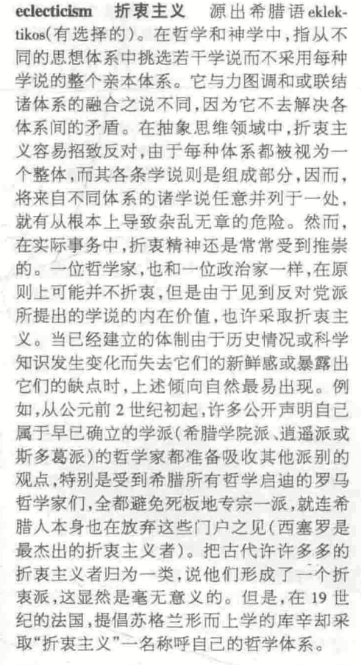|
|
本帖最后由 klwo2 于 2019-12-31 10:44 编辑
说实话,我还满惊讶的,为什么好多英汉词典说eclectic = 折衷呢?比如英汉大词典:
n. (哲学、科学、艺术等方面的)折中主义者;兼收并蓄的人(或学说)
咱先看W3:
selecting what appears to be best or true in various and diverse doctrines or methods : rejecting a single, unitary, and exclusive interpretation, doctrine, or method : of or relating to eclecticism : selective
这是从「多种」思想里面选「优」,或者选「真」
新牛津:
Philosophy Denoting or belonging to a class of ancient philosophers who did not belong to or found any recognized school of thought but selected doctrines from various schools of thought.
这是从「多种」思想里面选,没说选出什么结果
Random House Webster's Unabridged:
3. not following any one system, as of philosophy, medicine, etc., but selecting and using what are considered the best elements of all systems.
4. noting or pertaining to works of architecture, decoration, landscaping, etc., produced by a certain person or during a certain period, that derive from a wide range of historic styles, the style in each instance often being chosen for its fancied appropriateness to local tradition, local geography, the purpose to be served, or the cultural background of the client.
从「多种」风格里面选「最优」的
SOED:
That borrows freely or is derived from various sources or systems; broad rather than exclusive in matters of opinion, taste, etc.
可见,各大英英词典口径基本一致。下面看「折衷」(「折衷」和「折中」是同一个词的不同写法(异形词),所以只贴一个):
國語辭典:
辞海:
折衷
同“折中①”。取正之意。扬雄《反离骚》:“吾驰江潭之泛溢兮,将折衷乎重华。”
汉语大词典:
1. 取正,用爲判斷事物的准則。
2. 調節使適中。
3. 指調和不同意見或爭執。
「折衷」的意思,鲁迅也说得很清楚:
中国人的性情是总喜欢调和,折中的。譬如你说,这屋子太暗,须在这里开一个窗,大家一定不允许的。如果你主张拆掉屋顶,他们就会来调和,愿意开窗了。没有激烈的主张,他们总连平和的改革也不肯行。(《三闲集·无声的中国》)
又:
老先生们保存现状,连在黑屋子开一个窗也不肯,还有种种不可开的理由,但倘有人要来连屋顶也掀掉它,他这才魂飞魄散,设法调解,折中之后,许开一个窗,但总在伺机想把它塞起来。
「折衷」的内涵是「将极端的思想调和起来,取中间的道路,以中间的道路为正确的道路」,这跟eclectic「从多种思想中选优」的内涵比起来,不能说一毛钱关系也没有,可是顶多算擦边吧?
中间的道路一定是最优的道路吗?这个等号划不得,不然为什么会有「和事佬」「和稀泥」这种贬义词呢?「和事佬」最爱的不就是「折衷」吗?「和事佬」这种负面人物选出来的个个最优(正面情感)?
eclectic的汉译有很多,「兼收并蓄」「不拘一格」「博采众长」「择其善者而从」,都挺合适,为什么非要把擦边的「折衷」拉进来,做汉译词呢?
原来这根子,是从日语词典来的,请看:
21世紀電腦英漢漢英雙向辭典 = 新世紀英漢辭典 = 新英和中辞典
ec.lec.tic [ɪk`lɛktɪk, ɛk-; eˈklektik, iˈk-]
《源自希腊文“选择”的意思》
形容词
1 选择的, 取舍的
2 折衷主义的, 折衷性的
(指经过一番取舍后取其有利者)
「折衷」不是「指经过一番取舍后取其中」吗,怎么变「经过一番取舍后取其有利者」了?查原文:
2
折衷(せつちゆう)主義の,折衷的な 《あれこれ取捨していい所を取ることにいう》.
原来是日本人把「折衷」理解偏了,搞出来的
日本国語大辞典:
せっちゅう‐がくは 【折衷学派】
解説・用例
〔名〕
(1)相反する両方の学説を折衷した学派。
*哲学字彙〔1881〕「Eclecticism 折衷学派」
这……原来就是日本人翻错的哲学新词啊!
《日本国語大辞典》倒是没把「折衷」的意思理解错,有「折衷」必有「相反」「对立」,可是,Eclecticism 这个英文字本身,并不暗示「相反」「对立」啊!
有人说,我还是不放心。那好,我来带大家一起看Century Dictionary,这本里面解释得详细(例句、小义项不抄):
I Selecting; choosing; not confined to or following any one model or system, but selecting and appropriating whatever is considered best in all.
II One who, in whatever department of knowledge, not being convinced of the fundamental principles of any existing system, culls from the teachings of different schools such doctrines as seem to him probably true, conformable to good sense, wholesome in practice, or recommended by other secondary considerations; one who holds that opposing schools are right in their distinctive doctrines, wrong only in their opposition to one another.
In philosophy the chief groups of eclectics have been-
(1)those ancient writers, from the first century before Christ, who, like Cicero, infiuenced by Platonic skepticism, held a composite doctrine of ethics, logic, cte., aggregated of Piatonist, Peripatetic, Stofc, and even Epicurean elements;
(2) writers in the seventeenth century who, like Leibnitz, mingled Aristotelian and Cartesian principles;
(3) writers in the eighteenth century who adopted in part the views of Leihnite, in part those of Locke;
(4) Schelling and others, who held beliefs derived from various idealistic, pautheistic, and mystical philosophers;
(5) the school of Cousin, who took a mean position between a philosophy of experience and one of absolute reason.
Specifically—
(a)A follower of the ancient eclectic philosophy.
(b)In the early church, a Christian who believed the doctrine of Plato to be conformable to the spirit of the gospel.
(c)In medicine, a practitioner of eclectic medicine, either ancient or modern; an eclectic physician.
怎么这么长?原来Century Dictionary除了讲语词,还附带上了百科、文化(想想那些打广告说自己包含了「文化信息」的ESL辞典就想笑)。Century Dictionary举的这些例子里面,除了(5)the school of Cousin 能对应上「折衷」(took a mean position between……)以外,别的都不行,说「折衷」翻译偏了,没错吧?
再看Encyclopædia Britannica:
eclecticism
philosophy and theology
(from Greek eklektikos, “selective”), in philosophy and theology, the practice of selecting doctrines from different systems of thought without adopting the whole parent system for each doctrine. It is distinct from syncretism—the attempt to reconcile or combine systems—inasmuch as it leaves the contradictions between them unresolved. In the sphere of abstract thought, eclecticism is open to the objection that insofar as each system is supposed to be a whole of which its various doctrines are integral parts, the arbitrary juxtaposition of doctrines from different systems risks a fundamental incoherence. In practical affairs, however, the eclectic spirit has much to commend it.
A philosopher, no less than a statesman, may be eclectic not on principle but because he perceives the intrinsic merit of doctrines that happen to have been advanced by opposite parties. This tendency is naturally most apt to manifest itself when established systems are losing their novelty or revealing their defects as changes of historical circumstance or scientific knowledge occur. From the beginning of the 2nd century BC, for instance, a number of philosophers professing to be attached to long-established schools—the Greek Academy, the peripatetics, or the stoics—were ready to adopt views from other schools; and Roman philosophers, in particular, to whom all Greek philosophies were enlightening, often avoided rigid partisan commitments, which even the Greeks themselves were abandoning. (Cicero was the eclectic par excellence.) It is clearly pointless to group the numerous ancient eclectics together as if they formed an eclectic school. In 19th-century France, however, Victor Cousin, a proponent of Scottish metaphysics, adopted the name éclectisme as a designation for his own philosophical system.
这里面有能直接对应上「折衷」的东西吗?没有。
然而神奇的是,这段文字的汉译版,《不列颠百科全书》,硬说里头有「折衷主义」!

这段文字翻译得真是生硬啊!大家来评评理,这段文字里面哪里有实质上的「折衷」了?
有人说,我看到了「调和」俩字!
问题是,那个「调和」,说的其实是syncretism,不是eclecticism!(It is distinct from syncretism—the attempt to reconcile or combine systems—inasmuch as it leaves the contradictions between them unresolved. )
再看三民《大辞典》第一版:

大英百科说,syncretism 调和,而eclecticism 将矛盾、冲突的地方置之不顾、不调和。
三民《大辞典》却说eclecticism 折衷调和、syncretism 贸然接受,跟大英百科的说法正好相反!!
这就是硬要把eclectic说成是「折衷」,把自己都绕进去的下场。
————————————————————————————————————————————————————
eclectic = 折衷的流毒如此之深,以至于即便有那么几本辞典没说「折衷」,我也懒得表扬。
别的不说,大家请看,「折衷主義」还是一个喂鸡百科词条呢!
折衷主義是指在途徑或操作運用上,以不同的理論、方法、風格,揀選其中最佳要素,應用在新的創作中。在藝術或建築批評的特定脈絡場合,意指挪借多種視覺資源來創作新作品。
折衷主義建築,即現代和古典融合式的建築。如廣州東亞大酒店、 上海亞細亞大樓、上海揚子大樓、哈瓦那中央車站、國立臺灣大學校史館、臺北郵局、臺北公會堂、嘉義車站。
这就奇了怪了,难不成中国人看见「中西结合」「博采众长」「多元融合」的建筑,张嘴就是「啊,这栋楼真是折衷啊!」「啊这个酒店体现了折衷的风格!」???
跟「折衷」擦边的「中庸」,有时候反而是贬义词,怎么没听人说「啊,这栋楼真是中庸啊!」??
现代汉语词典·第5版
折中主义
zhézhōng zhǔyì 一种形而上学思想方法,把各种不同的思想、观点和理论无原则地、机械地拼凑在一起。
《现代汉语词典》里面的「折中主义」,符合「折衷」的意思,但是跟英语里面那个eclecticism一毛钱关系也没有,晕了吧?
————————————————————————————————————————————————————
总结:
别轻信英汉词典给的解释,人家表面上是英汉词典,说不定骨子里是英日辞典,被日本人的「汉语语感」害了呢!
本帖隐藏的内容强行打广告:我的 十大辞典mdx 里大部分是英英词典,没抱回家的童鞋快去领吧!
|
|